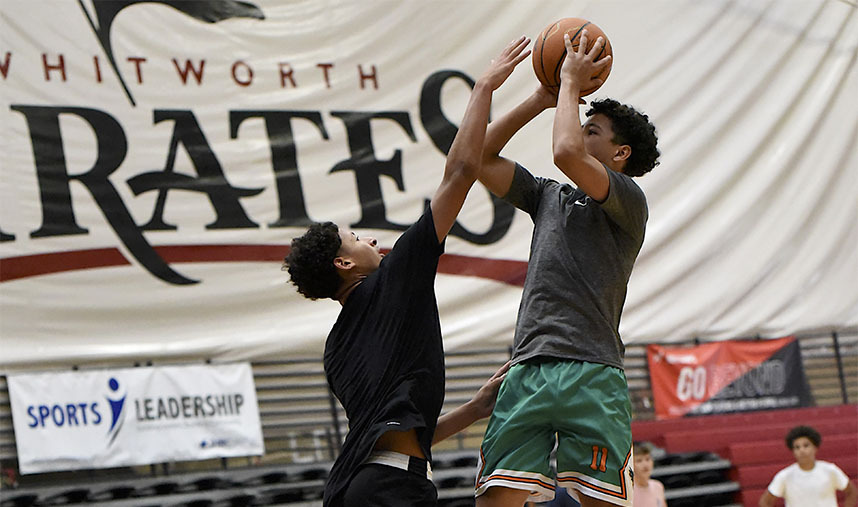November 28, 2022 | Tagged Motivation,
Playing Basketball with Confidence

Confidence on the basketball court is crucial for success. Research on confidence shows a high correlation between success on the basketball court and inner confidence. How do you get more confident?
Confidence is a word people assume comes with some level of expertise. Though we have read about confidence often, do we really understand confidence? More importantly, can we make sure our confidence is yielding the results on and off the court we want as athletes, coaches, and parents?
Research on confidence has found:
- Success and confidence are strongly correlated.
- Greater success increases confidence.
- Confidence is measured in thoughts, feelings, and behaviors.
- Elite athletes who had a higher level of confidence as demonstrated in their thoughts, feelings, and behaviors had higher levels of success.
- Confidence affects performance and performance affects confidence. A change in either affects the other for good or for bad. This is the confidence/performance cycle.
- Athletes who have resilience can rise out of this confidence/performance cycle if it turns negative.
Here are nine factors contributing to sports confidence (Hays et al. 2007)
- preparation
- performance accomplishments
- coaching
- innate factors
- social support
- experience
- competitive advantage
- self-awareness
- trust
BASKETBALL SEASON CONFIDENCE
Worst case scenario: The bench has its clear pecking order. The coaches have their decided favorites. The players have their ruts, and the parents have their bitterness.
Best case scenario: The bench is alive and a real part of the team success. The coaches are building a dynasty where every player improves. The players rise above their ordinary potential and achieve together a lasting brotherhood or sisterhood of power and dedication and the parents love and root for the other players on the team as much as their own children.
The difference between these two contrasting scenarios lies in the thought life of each person. Thoughts influence feelings and both influence behavior. Troubled feelings that dictate thoughts will always come below the standard of excellence. Each of us must decide what we think and how we choose to feel. It is the most noble of all our human capacities...the will to choose.
Basketball Confidence Self-Check Based on the Nine Factors of Confidence
What does basketball preparation look like and how do I know when I have hit this highest standard for my confidence to be based on truth?
Stats don’t lie. Do I keep a clear measurement of my athletic success and how do I know I am improving in these categories?
Do I have a consistent coach in my life who sees where I am and where I want to be and can clearly help me close the gap through encouragement and wisdom?
Do I have a history of success in my generational line, and do I have role models in the generations who have achieved their life goals?
Do I have people who support my goals and can help get me to programs and places I need for success?
Do I have enough experience to know the difference between confidence and cockiness? Do I know how to overcome fear? Am I resilient?
Does my natural ability give me a competitive advantage or does my personality help me do what I need to fairly achieve a competitive advantage?
Do I have enough self-awareness to know what I need to do to be successful?
Am I able to trust the process to know this is a journey toward success and not a sprint?
These nine factors work together to increase confidence. One of the biggest struggles athletes and parents have is truthfulness around preparation.
Are you truthful about your preparation? Athletes will tend to lean one of two ways: Fearful or Cocky
The Fearful Athlete
A fearful athlete or family is afraid to make mistakes. A fearful athlete will pass up a shot they should shoot. They tend to commit more turnovers and errors. They miss what their coach says in a timeout. They leave their opponent wide open. These are fear-based errors and result when the brain is flooded and unable to process.
There are many reasons why athletes or families can be fearful including natural temperament, a tendency toward being overly cautious, and being bullied by coaches or teammates or other family members. They are plagued by the fearful thoughts in their mind. Most importantly, it can hinder one’s ability to give and receive love.
The Cocky Athlete
A cocky athlete or family is really a liar, and they know deep down they are not being truthful about their abilities. They must overshoot, oversell, and overdo because they are lying to themselves about their skillset. A CIA specialist in spotting dishonesty says one of the telltale signs of a liar is their desire to convince everyone around them they are not lying. This is the cocky player or a cocky family. They are adamant they are good and trying so desperately hard to prove they are. Great players don’t care to convince anyone they are great. They simply prove it. They don’t have to overshoot; they don’t have to tell stories about themselves. They are confident and it shows in their stability and peace about not having to prove their value.
There are also many reasons why a player or family can be cocky including entitlement, lack of work ethic, doting parents, and narcissism or pride.
About NBC Basketball
NBC Basketball began in 1971 with the intention of building stronger and better athletes mentally, physically, relationally, and spiritually. This total camp for the complete person was created to not only address how to improve basketball skills but also how to improve relationships, mental toughness, confidence, resiliency, personal faith, courage, and leadership. NBC is an acronym that stands for Nothing Beats Commitment and the philosophy that a person's daily habits reveal their future. For more information about NBC Basketball visit www.nbccamps.com.